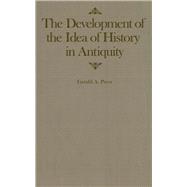The Development of the Idea of History in Antiquity
, by Press, Gerald A.- ISBN: 9780773510029 | 0773510028
- Cover: Hardcover
- Copyright: 11/1/2003
An extensive scholarly literature, written in the past century holds that in ancient Greek and Roman thought history is understood as circular and repetitive - a consequence of their anti-temporal metaphysics - in contrast with Judaeo-Christian thought, which sees history as linear and unique - a consequence of their messianic and hence radically temporal theology. Gerald Press presents a more general view - that the Graeco-Roman and Judaeo-Christian cultures were fundamentally alien and opposed cultural forces and that, therefore, Christianity's victory over paganism included the replacement or supersession of one intellectual world by another - and then shows that, contrary to this view, there was substantial continuity between "pagan" and Christian ideas of history in antiquity, rather than a striking opposition between cyclic and linear patterns. He finds that the foundation of the Christian view of history as goal-directed lies in the rhetorical rather than the theological motives of early Christian writers. An extensive scholarly literature, written in the past century holds that in ancient Greek and Roman thought history is understood as circular and repetitive - a consequence of their anti-temporal metaphysics - in contrast with Judaeo-Christian thought, which sees history as linear and unique - a consequence of their messianic and hence radically temporal theology. Gerald Press presents a more general view - that the Graeco-Roman and Judaeo-Christian cultures were fundamentally alien and opposed cultural forces and that, therefore, Christianity's victory over paganism included the replacement or supersession of one intellectual world by another - and then shows that, contrary to this view, there was substantial continuity between "pagan" and Christian ideas of history in antiquity, rather than a striking opposition between cyclic and linear patterns. He finds that the foundation of the Christian view of history as goal-directed lies in the rhetorical rather than the theological motives of early Christian writers.






